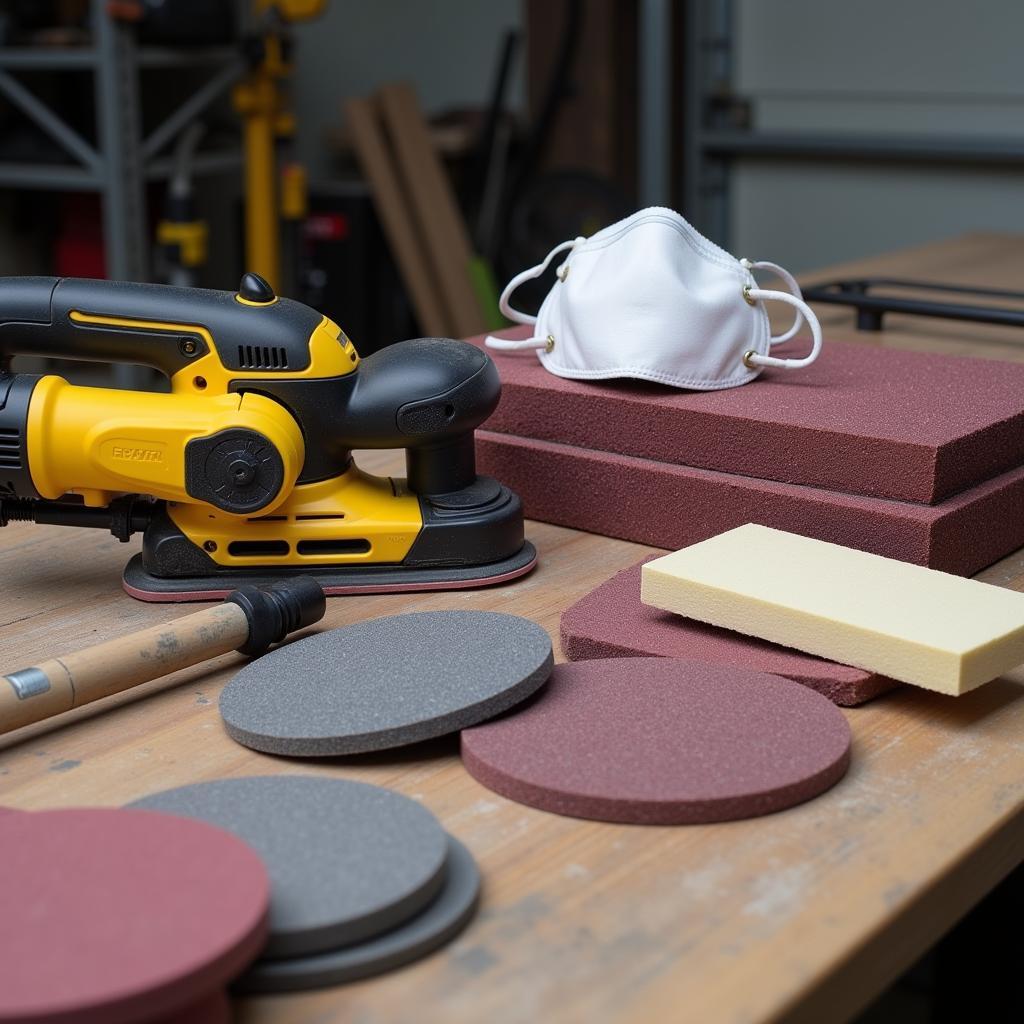Car Auto Body Tools are crucial for any auto body repair or restoration project. Whether you’re a professional technician or a DIY enthusiast, having the right tools can make the difference between a flawless finish and a botched job. This guide delves into the essential tools you need, their uses, and how to choose the right ones for your needs.
Understanding the Different Types of Car Auto Body Tools
Auto body work involves a wide range of tasks, from minor dent repair to major collision damage restoration. Each task requires specific tools to ensure efficiency and precision. Broadly, car auto body tools can be categorized into those used for dent removal, welding and cutting, body filling and sanding, painting and finishing, and measuring and alignment.
Dent Removal Tools
Dent removal tools are designed to reshape the metal back to its original form without the need for extensive bodywork. These include:
- Suction cup dent pullers: Ideal for small dents and dings, these tools create suction to pull out the dent.
- Slide hammers: Used for pulling out larger dents or those in hard-to-reach areas. They work by using inertia to pull the dent outward.
- Body hammers and dollies: These are essential for shaping and smoothing the metal after dent removal. Different hammer and dolly shapes allow access to various contours and curves.
After the initial dent removal, you might need dent removing tool for cars for finer adjustments.
Welding and Cutting Tools
Welding and cutting tools are essential for repairing structural damage and replacing damaged body panels. These include:
- MIG welders: Versatile welders that are commonly used in auto body repair for joining metal sheets.
- TIG welders: Offer more precision and control, ideal for welding thin sheet metal and creating clean, strong welds.
- Plasma cutters: Used for cutting through metal quickly and precisely. They are essential for removing damaged panels and creating precise cuts for new panels.
For precise alignment of the frame after welding, you might consider car frame tools.
Body Filling and Sanding Tools
After the metal work is complete, body filler is used to fill in any imperfections and create a smooth surface. Sanding tools then smooth out the filler and prepare the surface for painting.
- Body filler spreaders: Used to apply body filler evenly and smoothly over the damaged area.
- Sanding blocks and sandpaper: Essential for smoothing the body filler and creating a perfectly smooth surface for painting.
- Orbital sanders: Power tools that accelerate the sanding process and provide a more uniform finish.
 Car body sanding tools kit with orbital sander, sanding blocks, and sandpaper
Car body sanding tools kit with orbital sander, sanding blocks, and sandpaper
Painting and Finishing Tools
Painting and finishing tools are crucial for achieving a professional-looking finish.
- Spray guns: Used to apply primer, paint, and clear coat evenly and consistently.
- Paint mixing cups and sticks: Ensure the correct paint mixture and consistency.
- Masking tape and paper: Protect areas that shouldn’t be painted.
- Polishing and buffing pads: Used to achieve a high-gloss finish after painting.
Measuring and Alignment Tools
Accurate measurement and alignment are vital for ensuring the repaired vehicle is structurally sound and aesthetically pleasing.
- Measuring tapes and rulers: Basic tools for measuring panel gaps and alignment.
- Tram gauges: Used to measure the alignment of the frame and suspension.
- Laser measuring tools: Provide highly accurate measurements for precise alignment.
For more specialized measuring needs, consider a car body measuring tool.
Choosing the Right Car Auto Body Tools
Choosing the right car auto body tools depends on several factors:
- Your skill level: Beginners may not need the same high-end tools as professional technicians.
- The types of repairs you’ll be doing: Minor dent repair requires different tools than major collision damage restoration.
- Your budget: Car auto body tools can range in price from a few dollars to thousands of dollars.
What are common car auto body tools?
Common car auto body tools include hammers, dollies, sanding blocks, body filler spreaders, welding equipment, and various measuring devices. The specific tools required will depend on the nature of the repair work.
How do I use car auto body tools safely?
Always wear appropriate safety gear, such as gloves, eye protection, and a respirator when working with car auto body tools. Follow manufacturer instructions carefully and use tools only for their intended purpose. Ensure proper ventilation when working with paints and chemicals.
If you’re working on frame straightening, specialized tools like car frame stretching tools are essential.
Conclusion
Car auto body tools are essential for any auto body repair or restoration project. By understanding the different types of tools available and choosing the right ones for your needs, you can achieve professional-looking results. Investing in quality car auto body tools will save you time and frustration in the long run.
FAQ
- What are the most basic car auto body tools? Hammers, dollies, and sanding blocks are among the most basic tools.
- Do I need welding equipment for all auto body repairs? No, welding is primarily necessary for structural repairs.
- What safety precautions should I take when using auto body tools? Always wear appropriate safety gear and follow manufacturer instructions.
- How do I choose the right paint gun for my project? Consider the type of paint and the size of the area you’re painting.
- Where can I learn more about using car auto body tools? Numerous online resources and courses offer detailed instructions.
For further information on tools for specific projects, you might be interested in browsing rc car tools ebay.
When you need assistance, please contact us via WhatsApp: +1(641)206-8880, Email: [email protected], or visit us at 910 Cedar Lane, Chicago, IL 60605, USA. We have a 24/7 customer support team ready to help.

Leave a Reply